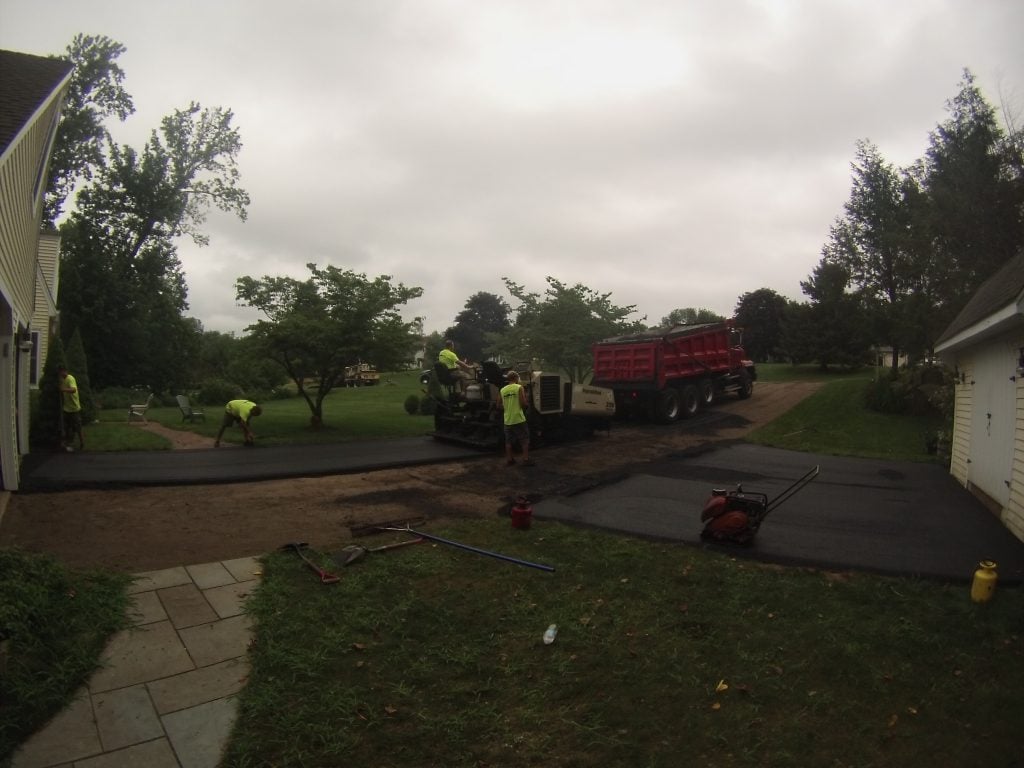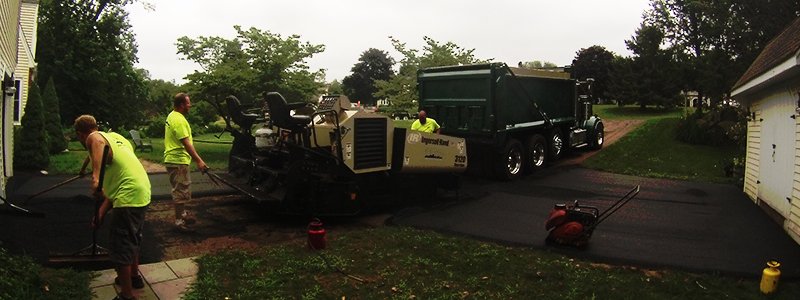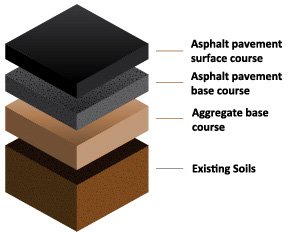Often times when a homeowner attempts to DIY a project, their main reason for doing so is to save money. But, what is also common, is that many DIY projects are a much bigger undertaking than originally expected. Because of this, the “cleanup” of a DIY project gone wrong can actually end up costing you more than it would have to hire a professional from the start. When it comes to DIY paving, although it may seem like a fairly straight forward and simple project, there are many parts to a paving project that an untrained homeowner may not know.
 The base – The base of your driveway or parking lot is one of, if not the most important elements of your asphalt pavement. If the base is constructed poorly, you will be left with a less than average finished product that will likely deteriorate quite quickly. Excavation depths can differ per job, but standard digging depth ranges from 6-8 feet. This sort of depth is extremely challenging for DIY pavers to complete because of the lack of professional equipment and machinery. Additionally, the depth needs to remain consistent throughout the entire surface area. Gravel is laid at the base (the amount depends on the type of pavement) which is used to facilitate draining and prevent settling.
The base – The base of your driveway or parking lot is one of, if not the most important elements of your asphalt pavement. If the base is constructed poorly, you will be left with a less than average finished product that will likely deteriorate quite quickly. Excavation depths can differ per job, but standard digging depth ranges from 6-8 feet. This sort of depth is extremely challenging for DIY pavers to complete because of the lack of professional equipment and machinery. Additionally, the depth needs to remain consistent throughout the entire surface area. Gravel is laid at the base (the amount depends on the type of pavement) which is used to facilitate draining and prevent settling.- The sub-grade surface – The sub-grade surface will need to be compacted, most commonly with special equipment to ensure effectiveness. For DIY paving projects, you may be able to rent a compactor, however, keep in mind this in an additional cost and knowing how to use one isn’t often common knowledge.
- Drainage – If the drainage isn’t completed properly, not only will your pavement deteriorate quickly (water is the most devastating element to asphalt), but it can also damage other important parts of your property like your home. The sub-grade of a paving project is often compacted into a slope with a drain installed at the lowest point, with the most important factor being that the water is draining away from your home. Continued water exposure on your home and foundation can lead to water damage, flooding, and mold. Mold remediation and flooding cleanup would be expensive fixes that could have been avoided by hiring a professional paver.
- Finishing products – Asphalt and concrete pavement will need to be raked to ensure a smooth finish.
 One of the biggest challenges DIY pavers are faced with is lacking the necessary machinery and equipment to efficiently get the job done. Homeowner’s may not know just how important the base of a paving project is, or may think this is an area where they can cut corners. However, this will lead to a poorly completed job and premature deterioration. If in fact your DIY paving project does not last long, you will have to do the project a second time, incurring all of the original costs and hassles again.
One of the biggest challenges DIY pavers are faced with is lacking the necessary machinery and equipment to efficiently get the job done. Homeowner’s may not know just how important the base of a paving project is, or may think this is an area where they can cut corners. However, this will lead to a poorly completed job and premature deterioration. If in fact your DIY paving project does not last long, you will have to do the project a second time, incurring all of the original costs and hassles again.
Additionally, paving can be a time-consuming project, and you may not have the time for a DIY paving project, especially if you are trying to pave a parking lot on your own. This may lead to a half-done project, which is not only an eye sore, but also a hazard. At the end of the day, there is always the possibility to try DIY paving, but before you get started, it is important to make sure you extensively understand what equipment is needed and follow a step-by-step how to guide. If you feel like you may not be able to complete your DIY paving job effectively, or you are not interested in the hassle, call the professionals at EastCoat Pavement Services today!



 The base – The base of your driveway or parking lot is one of, if not the most important elements of your asphalt pavement. If the base is constructed poorly, you will be left with a less than average finished product that will likely deteriorate quite quickly. Excavation depths can differ per job, but standard digging depth ranges from 6-8 feet. This sort of depth is extremely challenging for DIY pavers to complete because of the lack of professional equipment and machinery. Additionally, the depth needs to remain consistent throughout the entire surface area. Gravel is laid at the base (the amount depends on the type of pavement) which is used to facilitate draining and prevent settling.
The base – The base of your driveway or parking lot is one of, if not the most important elements of your asphalt pavement. If the base is constructed poorly, you will be left with a less than average finished product that will likely deteriorate quite quickly. Excavation depths can differ per job, but standard digging depth ranges from 6-8 feet. This sort of depth is extremely challenging for DIY pavers to complete because of the lack of professional equipment and machinery. Additionally, the depth needs to remain consistent throughout the entire surface area. Gravel is laid at the base (the amount depends on the type of pavement) which is used to facilitate draining and prevent settling.